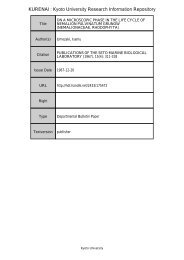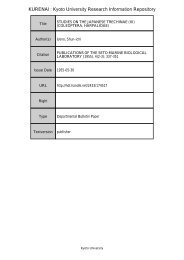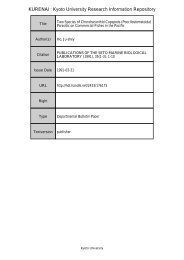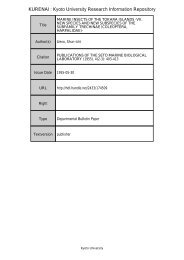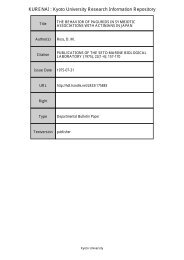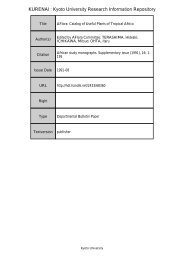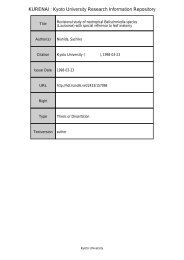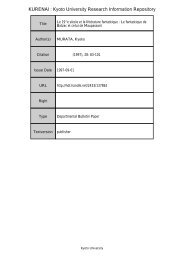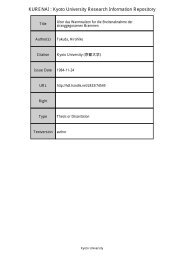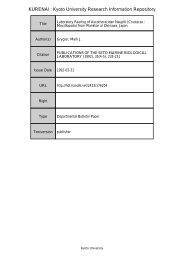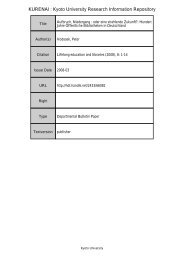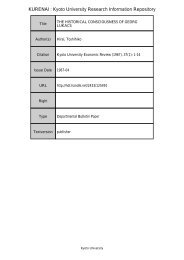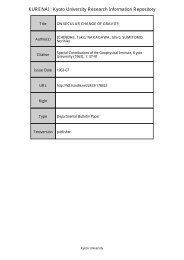Remaindered Life of Citizen-Man, Medium of Democracy
Remaindered Life of Citizen-Man, Medium of Democracy
Remaindered Life of Citizen-Man, Medium of Democracy
Create successful ePaper yourself
Turn your PDF publications into a flip-book with our unique Google optimized e-Paper software.
東 南 アジア 研 究<br />
49 巻 3 号<br />
“a constructive dialogue between the two forms <strong>of</strong> being” [ibid.: 120]. It demonstrates the<br />
uneven and contradictory progression <strong>of</strong> the domination <strong>of</strong> the logic <strong>of</strong> the technical image,<br />
which he argues is tending toward the making <strong>of</strong> “a new society <strong>of</strong> programmed and<br />
programming functionaries ... the totalitarianism <strong>of</strong> apparatuses” [ibid.: 123]. 37) While Flusser<br />
continues to maintain an understanding <strong>of</strong> freedom based on an implicit model <strong>of</strong> sovereign<br />
human agency (calling in effect for a reappropriation <strong>of</strong> this agency from its alienated form in<br />
the apparatuses <strong>of</strong> a programmed, technocratic society), my own view is that those forms <strong>of</strong><br />
non-human agency and bodily, perceptual faculties and capacities, which are remaindered by<br />
the normative protocols <strong>of</strong> capitalist democracy, persist and even proliferate in transformed<br />
ways as collective means <strong>of</strong> life, bearing democratic potentials and indeed forms <strong>of</strong> freedom<br />
whose exercise can be fleetingly gleaned in the popular revolts <strong>of</strong> People Power in the last two<br />
decades <strong>of</strong> the twentieth century.<br />
While I cannot fully expand on this claim here, I would go so far as to suggest that the<br />
dramatic, remarkable role <strong>of</strong> radio, television and cell phone technologies in the first two People<br />
Power events show the operation <strong>of</strong> modes <strong>of</strong> social being and communication, with their<br />
concomitant forms <strong>of</strong> aesthetic perceptual and sensorial practice, that anticipate the new social<br />
media technologies <strong>of</strong> the contemporary moment. In a sense, both events exemplify a kind <strong>of</strong><br />
tentative reverse subsumption and transformation <strong>of</strong> the technologies <strong>of</strong> political rule: broadcast<br />
technologies <strong>of</strong> radio and television, in the first, and cellular communication technology in the<br />
second. Built out <strong>of</strong> extant outmoded social faculties, which Flusser associates with mythical<br />
being and magical consciousness and which, not unrelatedly, Taussig associates with a mimetic<br />
faculty reinvigorated under modernity and forms <strong>of</strong> sympathetic magic potentiated by<br />
postcoloniality, the mediatic capacities <strong>of</strong> reciprocal, even multidirectional transmission and<br />
networked connection that characterize the use <strong>of</strong> media for political mobilization during these<br />
events can be argued to have developed out <strong>of</strong> a subterranean or “hidden” social history <strong>of</strong><br />
communicative technologies, which are not encoded or reified in the dominant technical<br />
hardware valorized and produced as means <strong>of</strong> production for capital (but which they<br />
nevertheless also course through, supplement, support as well as interrupt and contend with). I<br />
am not arguing that these mediatic capacities have any intrinsic or inherently greater<br />
democratic potential than the forms <strong>of</strong> human being and relation presumed and privileged by<br />
the ideal <strong>of</strong> citizen-man. I am, however, trying to expand the parameters by which we can<br />
recognize and understand the possible social relations and kinds <strong>of</strong> social and personal being<br />
that might comprise and define democratic life.<br />
Claims about the waning <strong>of</strong> regimes <strong>of</strong> normativity focused on the formation <strong>of</strong> citizen-man<br />
37) “The absurdity <strong>of</strong> the new way <strong>of</strong> being consists in the fact that man no longer plays games for<br />
others. Instead, the game is played for its own sake. The game becomes independent <strong>of</strong> man; it<br />
follows its own rules determined by chance; it becomes an autopathic game <strong>of</strong> permutations, thus<br />
transforming humans into game pieces, into numbers, and into functionaries. Programmed human<br />
beings and the game programs themselves are becoming increasingly well programmed for<br />
the programming <strong>of</strong> the game” [Flusser 2002: 123].<br />
492



